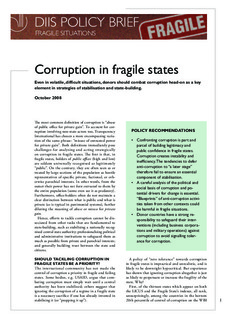| dc.contributor.author | Orre, Aslak Jangård | |
| dc.contributor.author | Mathisen, Harald W. | |
| dc.date.accessioned | 2018-01-04T08:16:22Z | |
| dc.date.available | 2018-01-04T08:16:22Z | |
| dc.date.issued | 2008-01-01 | |
| dc.identifier | oai:www.cmi.no:3235 | |
| dc.identifier.citation | Copenhagen: Danish Institute for International Affairs (DIIS Policy Brief - Fragile Situations) 4 p. | |
| dc.identifier.uri | http://hdl.handle.net/11250/2474621 | |
| dc.description.abstract | Policy recommendations:
Confronting corruption is part and parcel of building legitimacy and public confidence in fragile states. Corruption creates instability and inefficiency. The tendencies to defer anti-corruption to “a later stage” therefore fail to ensure an essential component of stabilisation.
A careful analysis of the political and social basis of corruption and potential drivers for change is essential. “Blueprints” of anti-corruption activities taken from other contexts could be harmful in fragile situations.
Donor countries have a strong responsibility to safeguard their interventions (including business corporations and military operations) against corruption to avoid signalling tolerance for corruption. | |
| dc.language.iso | eng | |
| dc.publisher | Danish Institute for International Affairs | |
| dc.relation | DIIS Policy Brief - Fragile Situations | |
| dc.relation.ispartof | DIIS Policy Brief - Fragile Situations | |
| dc.relation.ispartofseries | DIIS Policy Brief - Fragile Situations | |
| dc.relation.uri | https://www.cmi.no/publications/3235-corruption-in-fragile-states | |
| dc.title | Corruption in Fragile States | |
| dc.type | Research report | |
